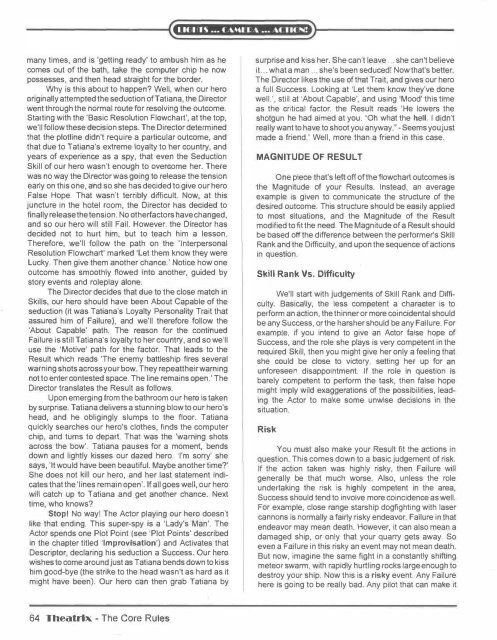Untitled - Index of - Free
Untitled - Index of - Free
Untitled - Index of - Free
You also want an ePaper? Increase the reach of your titles
YUMPU automatically turns print PDFs into web optimized ePapers that Google loves.
many times, and is 'getting ready' to ambush him as he<br />
comes out <strong>of</strong> the bath, take the computer chip he now<br />
possesses, and then head straight for the border.<br />
Why is this about to happen? Well, when our hero<br />
originally attempted the seduction <strong>of</strong>Tatiana, the Director<br />
went through the normal route for resolving the outcome.<br />
Starting with the 'Basic Resolution Flowchart', at the top,<br />
we'll follow these decision steps. The Director determined<br />
that the plotline didn't require a particular outcome, and<br />
that due to Tatiana's extreme loyalty to her country, and<br />
years <strong>of</strong> experience as a spy, that even the Seduction<br />
Skill <strong>of</strong> our hero wasn't enough to overcome her. There<br />
was no way the Director was going to release the tension<br />
early on this one, and so she has decided to give our hero<br />
False Hope. That wasn't terribly difficult. Now, at this<br />
juncture in the hotel room, the Director has decided to<br />
finally release the tension. No otherfactors have changed,<br />
and so our hero will still Fail. However, the Director has<br />
decided not to hurt him, but to teach him a lesson.<br />
Therefore, we'll follow the path on the 'Interpersonal<br />
Resolution Flowchart' marked 'Let them know they were<br />
Lucky. Then give them another chance.' Notice how one<br />
outcome has smoothly flowed into another, guided by<br />
story events and roleplay alone.<br />
The Director decides that due to the close match in<br />
Skills, our hero should have been About Capable <strong>of</strong> the<br />
seduction (it was Tatiana's Loyalty Personality Trait that<br />
assured him <strong>of</strong> Failure), and we'll therefore follow the<br />
'About Capable' path. The reason for the continued<br />
Failure is still Tatiana's loyalty to her country, and so we'll<br />
use the 'Motive' path for the factor. That leads to the<br />
Result which reads 'The enemy battleship fires several<br />
warning shots across your bow. They repeattheir warning<br />
not to enter contested space. The line remains open.' The<br />
Director translates the Result as follows.<br />
Upon emerging from the bathroom our hero is taken<br />
by surprise. Tatiana delivers a stunning blow to our hero's<br />
head, and he obligingly slumps to the floor. Tatiana<br />
quickly searches our hero's clothes, finds the computer<br />
chip, and turns to depart. That was the 'warning shots<br />
across the bow'. Tatiana pauses for a moment, bends<br />
down and lightly kisses our dazed hero. 'I'm sorry' she<br />
says, 'It would have been beautiful. Maybe another time?'<br />
She does not kill our hero, and her last statement indi<br />
cates that the 'lines remain open'. If all goes well, our hero<br />
will catch up to Tatiana and get another chance. Next<br />
time, who knows?<br />
Stop! No way! The Actor playing our hero doesn't<br />
like that ending. This super-spy is a 'Lady's Man'. The<br />
Actor spends one Plot Point (see 'Plot Points' described<br />
in the chapter titled 'Improvisation') and Activates that<br />
Descriptor, declaring his seduction a Success. Our hero<br />
wishes to come around just as Tatiana bends down to kiss<br />
him good-bye (the strike to the head wasn't as hard as it<br />
might have been). Our hero can then grab Tatiana by<br />
64 Theatr-lx - The Core Rules<br />
surprise and kiss her. She can't leave ... she can't believe<br />
it... what a man ... she's been seduced! Now that's better.<br />
The Director likes the use <strong>of</strong> that Trait, and gives our hero<br />
a full Success. Looking at 'Let them know they've done<br />
well.', still at 'About Capable', and using 'Mood' this time<br />
as the critical factor, the Result reads 'He lowers the<br />
shotgun he had aimed at you. "Oh what the hell. I didn't<br />
really want to have to shoot you anyway."- Seems you just<br />
made a friend.' Well, more than a friend in this case.<br />
MAGNITUDE OF RESULT<br />
One piece that's left <strong>of</strong>f <strong>of</strong> the flowchart outcomes is<br />
the Magnitude <strong>of</strong> your Results. Instead, an average<br />
example is given to communicate the structure <strong>of</strong> the<br />
desired outcome. This structure should be easily applied<br />
to most situations, and the Magnitude <strong>of</strong> the Result<br />
modified to fit the need. The Magnitude <strong>of</strong> a Result should<br />
be based <strong>of</strong>f the difference between the performer's Skill<br />
Rank and the Difficulty, and upon the sequence <strong>of</strong> actions<br />
in question.<br />
Skill Rank Vs. Difficulty<br />
We'll start with judgements <strong>of</strong> Skill Rank and Diffi<br />
culty. Basically, the less competent a character is to<br />
perform an action, the thinner or more coincidental should<br />
be any Success, or the harsher should be any Failure. For<br />
example, if you intend to give an Actor false hope <strong>of</strong><br />
Success, and the role she plays is very competent in the<br />
required Skill, then you might give her only a feeling that<br />
she could be close to victory, setting her up for an<br />
unforeseen disappointment. If the role in question is<br />
barely competent to perform the task, then false hope<br />
might imply wild exaggerations <strong>of</strong> the possibilities, lead<br />
ing the Actor to make some unwise decisions in the<br />
situation.<br />
Risk<br />
You must also make your Result fit the actions in<br />
question. This comes down to a basic judgement <strong>of</strong> risk.<br />
If the action taken was highly risky, then Failure will<br />
generally be that much worse. Also, unless the role<br />
undertaking the risk is highly competent in the area,<br />
Success should tend to involve more coincidence as well.<br />
For example, close range starship dogfighting with laser<br />
cannons is normally a fairly risky endeavor. Failure in that<br />
endeavor may mean death. However, it can also mean a<br />
damaged ship, or only that your quarry gets away. So<br />
even a Failure in this risky an event may not mean death.<br />
But now, imagine the same fight in a constantly shifting<br />
meteor swarm, with rapidly hurtling rocks large enough to<br />
destroy your ship. Now this is a risky event. Any Failure<br />
here is going to be really bad. Any pilot that can make it



